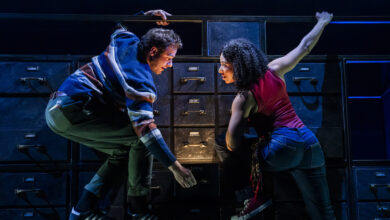The Beloved, Bush Theatre
Written and Directed by Amir Nizar Zuabi
A ShiberHur, Young Vic production co-produced with the Bush Theatre and KVS Brussels, part of World Stages London
★★★★
Pros: Original, engaging, thought-provoking.
Cons: Bit weird and very uncomfortable in a couple of places.
Our Verdict: A great venue if you’ve never been before. Go if you want to really be challenged by something.
| Courtesy of Spoonfed |
When I sat down in the auditorium and read ‘young lamb’ in the cast list I was a little anxious. Ironically, the lambs turned out to be my favourite bit of the evening, which shows just how off my female intuition is! The lambs, popping up unexpectedly from various places in the set, are a sort of moral compass or in their words, ‘the keepers of dreams’. They serve as a kind of thought-provoking conscience for the characters but also for the audience whilst simultaneously lifting the mood of what is otherwise quite a sombre performance. For me the lambs’ most poignant moment is when they talk about the modern shift in how meat is slaughtered and they provide a convincing argument for how humans have lost touch with everything they do from slaughtering to warfare. Linking this to the play’s setting in a conflict zone made a deep impression on me.
I hesitated at giving this play four stars mostly because I was unsure about how to feel about the subject matter, but listening to the post-show discussion, I realised that that’s actually the desired effect. The subject matter, namely the religious (and slightly mythological?) story of Abraham’s sacrifice of his son to God, is actually very uncomfortable when you’re confronted with it in this way. Additionally, playwright Amir Nizar Zuabi doesn’t shy away from raw, difficult moments and makes even the young cast member deal with some pretty explicit stuff. Incidentally, the young actor, playing Abraham’s son, does remarkably well with a difficult character. Seeing a woman’s water break is definitely up there with the more uncomfortable things I have seen on stage, yet for the sheer reason that this play made me feel so much discomfort and anguish, it does deserve four stars.
The end of the play is punctuated with something of a question mark, deliberately, as the playwright is very clear that he doesn’t want to form our opinions or beliefs for us. The material poses a questions of morality for us all to ponder on and I think everyone who goes to see this play will have a very personal reaction to it.
Supported by the Young Vic, the ShiberHur Company has already performed in London twice previously and after seeing this performance I’d say this is a company that adds a real voice to the theatre scene in this country. Their achievements are something the Young Vic can be proud to be a part of, especially when you consider that English is a second language for the Arabic and Hebrew actors.
This is undoubtedly a thoroughly original piece of new writing and one of the great things about the World Stages Festival is the breath of fresh air it gives to new writing in this country. Understandably, if you just stay within London, after a while you run the risk of coming across quite similar genres and styles. World Stages brings us artists from all over and stories from all over too, some of which we have never even imagined before.
The Bush Theatre, itself a new writing house, has done brilliantly in picking up and supporting this play and it’s evident that it really means something to them to be able to stage it. As the Artistic Director explained at the post-show discussion, the Bush has never before engaged in hosting international plays. Hopefully the World Stages festival has opened the doors for plenty more in the future.
Please feel free to leave your thoughts and opinions in the comments section below!
The Beloved runs at the Bush Theatre until 9th June 2012.
Box Office: 020 8743 5050 or book online at http://www.bushtheatre.co.uk/
More information about the World Stages Festival available at http://worldstageslondon.com/






